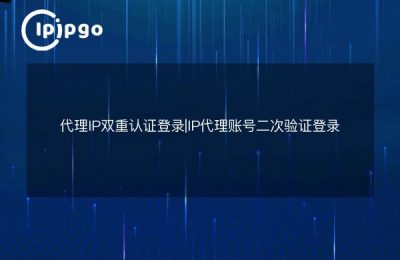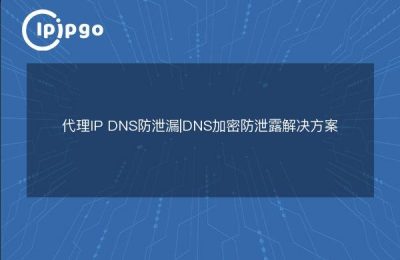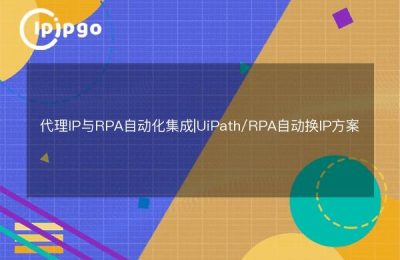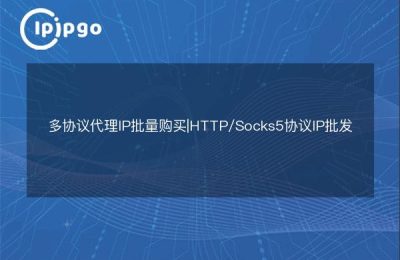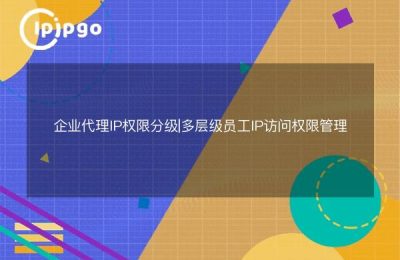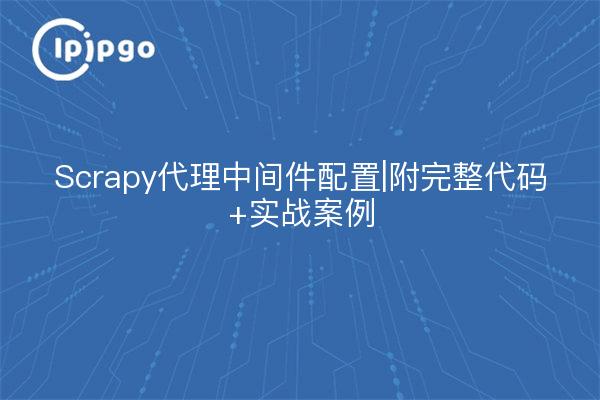
Hands-On Configuration of Scrapy Proxy Middleware
Students who have done data collection have encountered the problem of anti-climbing blockade, which requires a proxy IP to break the game. Today, I'd like to share with youA real-world configuration scheme for proxy middleware in the Scrapy framework, combined with ipipgo's premium proxy IP resources, to make your crawler run more stable.
I. Why Scrapy Needs Proxy Middleware
When the target website detects a large number of requests from the same IP, it will limit the access speed in a light case or directly block the IP address in a heavy case. This can be achieved through proxy middleware:
1. Automatic switching of different IP addresses
2. Breaking the frequency of requests
3. Avoid triggering anti-climbing mechanisms on websites
II. Base Agent Middleware Configuration
Add a new proxy middleware class to the middlewares.py file of your Scrapy project:
class IpProxyMiddleware.
def process_request(self, request, spider): proxy = "".
proxy = "http://用户名:密码@gateway.ipipgo.com:端口"
request.meta['proxy'] = proxy
Note the substitutionUsername, password, portauthentication information for ipipgo, it is recommended that sensitive information be stored in the settings.py configuration file.
Third, the actual combat: intelligent rotation proxy IP
Directly using a fixed proxy is not flexible enough, we recommend using ipipgo'sDynamic Residential Agentsservices, in conjunction with the API to enable automatic IP changes:
import random
from scrapy import Request
class RandomProxyMiddleware.
def __init__(self, api_url): self.proxy_list = [...].
self.proxy_list = [...]. Getting the latest proxy pool via the ipipgo API
def process_request(self, request, spider): self.proxy_list = [...].
proxy = random.choice(self.proxy_list)
request.meta['proxy'] = proxy
request.headers['Proxy-Authorization'] = basic_auth_header
def update_proxies(self).
Timed call to the ipipgo API to update the proxy pool
Fourth, the e-commerce platform collection of practical cases
Take an e-commerce platform product data collection as an example:
1. Enable middleware in settings.py
2. Configure the interval between API calls for ipipgo (5-10 minute IP change recommended)
3. Setting up an exception retry mechanism
4. Add request delay (0.5-1 seconds)
Example of settings.py configuration
DOWNLOADER_MIDDLEWARES = {
'project.middlewares.RandomProxyMiddleware': 543,
}
PROXY_API = "https://api.ipipgo.com/getproxy"
RETRY_TIMES = 3
DOWNLOAD_DELAY = 0.7
V. Frequently Asked Questions QA
Q: What should I do if my proxy IP fails frequently?
A: It is recommended to use ipipgo'sDynamic Residential AgentsThe IP survival cycle has been specially optimized, and with the automatic switching mechanism, it can effectively solve the problem.
Q: What do I do if I encounter CAPTCHA validation?
A: ipipgo'sResidential AgentsIP from the real home network, with a reasonable collection frequency, can significantly reduce the probability of triggering the verification code
Q: Do HTTPS sites require special configuration?
A: ipipgo supports full protocol proxies, just add the following code in the middleware:
request.meta['proxy'] = "https://" + proxy
VI. Why ipipgo
1. Global coverage: Support 240+ countries and regions location acquisition
2. High anonymity: Real residential IP, no proxy features in request header
3. Agreement complete: Perfect support for HTTP/HTTPS/SOCKS5 protocols
4. quality assurance (QA): IP pool updated daily with 90 million + available resources
By reasonably configuring the proxy middleware, combined with ipipgo's high-quality proxy resources, you can effectively solve the IP restriction problem in the collection process. It is recommended to test the specific effect through free trial first, and choose the most suitable proxy program according to the business requirements.

